Introduction
Did you know that inflammation affects your gut AND your mental health?
What if the symptoms that you have been experiencing aren’t depression or anxiety?
In this week’s vodcast, board-certified holistic psychiatrist Dr. Achina Stein shares her family’s story with mental health and explains crucial steps on how to S.H.I.F.T. your life towards health and happiness!
The information in this interview saved Dr. Stein’s son’s life and led her down a path that led to holistic psychiatry.
This episode not only provides essential steps on how to build a life you want to live but also ignites hope for those suffering from a mental health condition.
Watch the Interview:
On this week’s episode, we learned:
🤯 The mental health symptoms some people experience may not be depression or anxiety.
❗️ How inflammation affects the gut AND your mental health.
🧠 The critical steps on how to S.H.I.F.T. your life towards health and happiness.
💊 The time and place for anti-depressants and how to safely come off of medications.
🌱 Common nutrient deficiencies in mental health conditions
💚 And most importantly, how to find hope after your mental health diagnosis.
And much more!
Additional Resources
To connect with Dr. Achina Stein and discover more of her work, you can find her on Instagram and Facebook. You can also visit her website here.Transcript
Sarah: Hello and welcome back to the Goodness Lover Show. Today we're talking to Dr. Achina Stein who's a holistic psychiatrist to tell us about the functional medicine approach to mental health. She shares her powerful story of her son and his mental health journey, and also the role of the gut and nutrition in improving mental health outcomes. Let's get into it.
Matt: Dr. Achina Stein, it's so good to have you on the show with us. We're so excited to talk to you. People loved everything you got to say on the gut brain solutions. So welcome to the show.
Dr. Achina Stein: Thank you so much. I'm really happy to be here.
Matt: So you're a really interesting mix and the perfect mix for the show actually in terms of your training and background, how did you get started or what was your journey like going down this path of functional psychiatry?
Dr. Achina Stein: Well, I worked as a traditional psychiatrist for 20 years, 15 years, well, it's been 25 so I have to subtract. So about 15 years, and just seeing patients one after the other, mostly prescribing medications for my patients, and I also do psychotherapy, I'm trained in psychotherapy as well. So I spent a lot of time trying to understand my patients from a biopsychosocial approach, that's how I was trained to treat my patients.
And I basically searched for what whatever methods I could in order to help all of my patients, spent a lot of time with my patients. But one day my son became very ill, and we were actually in France, my husband is a professor and we took a trip to India and then France, his sabbatical. And so we decided to take the kids out of school and homeschool them, and we traveled all over India and France. And there was a time where we were just sitting and doing some homework, and we were going to go to a little store afterwards to buy some board games and my son had a little fight with my other son, and he disappeared from the room and he suddenly was on a ledge. We were on fifth floor on a ledge ready to jump. I don't know if I ever told you that story but he became acutely suicidal and depressed, very, very depressed and suicidal.
And the thing is, something changed in him, it wasn't just a classic situation where he was depressed and suicidal, he also couldn't read anymore. And so something changed in his brain and I knew this was something more than going on than just a classic depression, and it was like a switch turned because it came out of the blue.
And so when basically, obviously, I got him off the porch, off the ledge and once we got home to the US, I had him see a psychiatrist, and he was put on three or four medications at the time to stabilize him. Fortunately, he was no longer suicidal, the depression was better. But things, in other ways, got worse. He started having attention problems, sleep problems, and it was just to the point where this wasn't my son anymore. Luckily he was safe, the medication certainly saved his life, but he just wasn't the same person. He was having side effects from the medications.
And it's interesting that when you're a psychiatrist, and you're seeing patients for a while, and you think that, okay, well, this is just the way it is, if you have side effects, that's all we can do, or this is the best that we can do with medications. And I have to say, it was in this place where, this is not okay for my son, I mean, I'm not willing to accept this. I need to do more than this.
And I always wonder if it wasn't the reading piece, if that reading piece didn't show up in part of his symptomatology, I wonder, maybe I would have accepted that this is just the way it is because depression runs on both sides of our family, it's definitely a strong family history, so it's very possible that I may have just said, okay, well, this is the way it is, we'll do whatever we can with medications and psychotherapy, which is what we did. But that piece of not being able to read anymore is what made me think something else is going on.
And so I searched and searched, and I talked to doctors, and I talked to this doctor, and I talked to that doctor, and I just wasn't getting anywhere with it. And so I started doing a deep dive of research on my own, and coincidentally, I happened to also be looking for other options for some of my patients where they just weren't getting better and I couldn't figure out why, and I knew there's something I don't know that I need to learn, so I was looking into alternative methods of healing.
So I happen to serendipitously find a functional medicine doctor, and I his name, and I always tell everybody his name because he literally saved my son's life and put me on this path, had I not found him, and his name is Dr. Edward Levitan, and he has a practice in Newton, Massachusetts called Five Journeys.
But anyway, so he basically did the functional medicine approach and found him to have celiacs disease, and he was nutritionally deficient, he had a whole slew of issues really. And we had put him immediately on a gluten and dairy free diet, and started moving towards soy. So he got better in some ways, but then we learned that he's actually sensitive to soy, so he had other issues. And then when we got food sensitivity testing, we pulled the soy out of his diet and he became so much better just by removing those three foods.
And what's great about that is that he bought into it immediately because he felt so much better. And the thing is, when you look at root causes, a lot of these root causes are there for years. And so there were symptoms, I always considered him a healthy boy, but he actually had years of constipation, severe constipation. And he had severe eczema to the point where his hands look like dinosaur hands, I would actually say he's part dinosaur when he was four years old, he knew all the names of the dinosaurs, he's like, you're part dinosaur, look at your hands. But those were the symptoms that cleared up, the constipation and the eczema completely went away within a couple months, completely.
And he suffered from that. So he saw that, that got better. So, generally, mental health symptoms take much longer. So he bought into the whole thing, once those symptoms got better, he started eating, he used to not eat any vegetables or no vegetables, except for corn, but he mostly ate pasta, milk products, all white foods, all of them white. I think the only vegetable at that time that he ate was broccoli, which is a good vegetable, but you need to eat [crosstalk] a lot of vegetables.
Matt: Of all of them. You take broccoli a lot.
Dr. Achina Stein: Yes. So it was definitely a big change for him in terms of trying all the different foods. And he actually took to it nicely. There's a lot of kids who really fight tooth and nail when it comes to that. So that and we treated his gut, and certainly with the celiacs disease we had to do a whole gut restoration. But it took a good year for the depression to completely remit and come off medication. My times might be off, I've been interviewed on so many podcasts [inaudible] off, because it's been 10 years [crosstalk] now. But it took longer for [crosstalk].
Sarah: Watch out if anyone is sleuthing on all your different podcasts Dr. Achina. On this one she said it took 18 months.
Dr. Achina Stein: I know. So, yes, it took longer for the anxiety and the sleep but he finally came off eventually off all the medications. So he was on an antidepressant, he was on a benzodiazepine, what else was he on? He was on Adderall. And I know there was a fourth medication but I can't I remember it right now. But he was on three or four medications, but he was able to come off of all of those medications I would say in about a year. And he did continue with some psychotherapy but overall, he did really, really well.
So that doesn't mean to say it stayed that way, he went to college, and of course your friends want to go out to the Chinese restaurant, Chinese food has soy in it, so he started putting soy back into his diet and cheat here, cheat there. And then you're up like vampires until two o'clock in the morning, and drinking, and then there's exams and the stress of that. So by the end of college he was a complete mess. But as soon as he graduated from college he got back on. The thing about this, about functional medicine is that once you know it works, you know what you need to do. So he knew exactly what he needed to do to get back into the swing of things and he did. And so he's doing great again.
Matt: That's amazing.
Sarah: What a story.
Matt: And, yes, I guess we take it's amazing to hear that story, and unfortunately though, a lot of people don't have that sort of story. Obviously, it's amazing that you were able to get the help that you could get and we celebrate that. And maybe someone listening right now hasn't had as much of a heartfelt story, and this is what we want to give you hope from these interviews is in the sense that change can happen. It's the smallest things like those little sensitivity testing, and those little things you discovered were huge for turning his mental health around. So I'm curious to know how this experience framed your pursuit as a doctor and your approach as a practitioner?
Dr. Achina Stein: Yes. I mean, of course once you go through that, you just can't unknow what you just learned. What I literally did is I asked Dr. Levitan if I could work for him, and I left my job.
Matt: That's amazing.
Dr. Achina Stein: I was the medical director for community mental health center from 2004 to 2010. And when we went to Europe, we came back, and came back to that job, and I basically asked him, "I have to learn this, I have to do this, I need to do this for my patients as well." And then I pursued training through the Institute for Functional Medicine and I became a certified practitioner. And so I worked, at the time it was called Visions Health Care until 2015, and then once they closed I opened my practice, Functional Mind in Rhode Island. And I've been doing that ever since.
So, yes. So I basically, I did write a book called, What If It's Not Depression? Because so many people have this idea that once you have a diagnosis of depression, of course, it's this whole spectrum of symptoms that you can have, from having the symptom of depression, and then going across to the clinical depression, and then there's, of course, different severities of depression that you can have to the point of having even psychosis.
So, the functional medicine approach can, sorry, help all people in that spectrum. Certainly, people who are on the milder side are going to recover much quicker than the people who are on the other extreme side because many people who are on the extreme side are usually on multiple medications, and then there's different levels of functioning. So, the thing about functional medicine is that it does take work, I mean, it's not just popping a pill, you have to make changes in your life. And so it is work, and you have to be willing to do that work.
And so when people call to work with me, I mean, I have a free consultation, and it's really to let people know, are you willing to do one, two, three, four, five? Because if you're not, then don't even waste your time. I'm not going to waste your time, I'm not going to take you down this road and then surprise, this is what you need to do. It's like, whoa.
So I want to make sure that they know what they're getting into, which is why I actually wrote the book because so when people call, it's like, I heard about functional medicine, they don't really understand what it entails. So I say, read my book and then you'll get a really good idea of what you need to do, and then I'll guide you through it. So it's one thing to be able to read something, but then to actually implement, I mean, there's thousands of self help books out there, right, what's the difference between reading something and actually making it happen? It's having a coach essentially to walk you through it, and to be your cheerleader. But ultimately, I would be your guide, but you're doing the work, right.
So it is making major lifestyle changes. And for some people, it's not so major because they've already implemented, they've already watched your videos and learned, well I'll put in greens and I'll add proteins and fats, because you start learning and you start adding things in, and then start exercising and getting standing desks, and just getting out of your chair and moving as much as possible, there's all of these things that you can do.
So my approach is basically the classic functional medicine approach, but it's to target symptoms of depression and anxiety, and just basically removing all of the things that can cause inflammation in your body. And so the understanding is that your gut is connected to your brain through the vagus nerve, and everything really starts in the gut, and if you can reduce inflammation in your gut, then you're going to reduce inflammation in your brain.
And obviously, that's just one root cause, there's going to be other things that can cause depression, your your environment can contribute to depression, that your relationships if they're toxic, on some level can contribute to depression, if you've had past trauma that can contribute to depression, just general dissatisfaction in terms of purpose in your life. There's multiple things that can contribute to depression, but I find that if you can get the foundation of the gut in order, everything else falls into place so.
So we're removing what's causing inflammation, replacing what's missing in the body to work optimally, have all of your organs working optimally. And it's also looking at, in terms of digestion, digestion is so important, it's amazing how many people don't really understand how important digestion is important for assimilating all of the nutrients. Assuming that you're putting all the right foods in your body, you want to make sure that you are releasing the digestive enzymes, and the bile acids, and hydrochloric acid to break down all of that food and assimilate through the gut lining. And it's those proteins, those amino acids that actually are manufactured by your gut microbiome to make the neurotransmitters that your brain needs.
So we're removing what's causing inflammation, replacing what's missing, reinoculating the gut microbiome, and then repairing the gut lining. And so 80% of your immune system is in your gut, and 80% of your serotonin is made in your gut, so if you can get those organized and start manufacturing in your gut, then your brain is going to definitely benefit from that.
And so there's five areas that I look at in terms of removing inflammation, we start with food, and then there's chronic infections, foods, infections, toxins, stress. And those four all can affect your hormones, particularly cortisol, cortisol is a major stress hormone, essentially. And if you're body is requiring constant release of cortisol, then that's going to eventually affect your sex hormones because you need cortisol to survive and it's going to pull from progesterone, and estrogen, and testosterone, depending on whether or not you're a man or a woman, to make cortisol. And so it's really important to figure out well, what's causing that that cortisol to increase? And look at all those factors. And again, inflammation is a major cause, but what's causing the inflammation.
So, if you can get your cortisol levels down, and inflammation down, and bring the body back into balance by shifting your body, and that's what those five areas spell, so stress, hormones, infection, foods, and toxins, then you can really bring the body back into balance. So that's in a nutshell. Some people that I work with, it takes a good, I would say, four to six months to do all the work. Some people take longer, because there are some issues that, if you find, are going to take longer. And I always use the analogy of if you wanted an estimate of how much it would cost to put an addition on your house, they'll look at it and decide, it'll be X number of dollars, and then they start taking down walls, it's like, you have termites here, this is going to take longer because we got to get rid of the termites. You have mold, you have mold behind this wall. There's been water damage or something because of the roof leaking.
And you don't even realize that until you just start pulling things apart. And it's the same thing when it comes to functional medicine is that you start pulling things apart, and there are things that can take longer, you'll find that person has Lymes disease, or they have other tick borne illnesses, or they have mold in their body or mold exposure, mold in their house. And so obviously, those kinds of things, when they pop up, through your investigation, that's going to extend how long it takes.
So some people have small intestinal bacterial overgrowth, some people have significant trauma that they really need to address in psychotherapy. They might be already addressing it in psychotherapy and they're seeing a psychotherapist, and they come to see me for the functional medicine, but that's something that it just takes longer when it comes to trauma, especially if you're always triggered and you're constantly in fight flight, then I always say you need to put meditation on the front burner, especially.
So part of my intake includes the A score, I don't know if you're familiar with that, the adverse childhood events score. That helps me to know right away, we need to put stress reduction on the front burner. And I cannot believe how many people aren't informed about meditation and emotional freedom technique by their psychotherapist. I mean, those are really good tools to help with trauma and all of the negative things that you might say to yourself over and over again, day in and day out, being able to look at your cognition and being able to use tapping, and meditation, and deep breathing, to try to bring down inflammation that's related to emotional toxins, right.
So there's a lot of tools out there to help you to know what you need to be more aggressive about in terms of trauma. So there's so many things I could talk about [crosstalk]. I could talk for hours, I'm sorry.
Sarah: That's great. It's great, thank you. So we have this shift method essentially, you're saying five letters. S was stress. T, trauma, was that ... Sorry.
Dr. Achina Stein: Yes.
Sarah: I can spell.
Dr. Achina Stein: Stress, hormone-
Sarah: H, hormone.
Matt: This is going on YouTube Sarah, and she's the most naughty speller with me.
Sarah: Let's edit that out.
Matt: I'm finally vindicated.
Sarah: I, inflammation, was I inflammation?
Dr. Achina Stein: I is for infections, chronic infections.
Sarah: Infections, okay. And then F-
Dr. Achina Stein: Foods.
Sarah: And then T.
Dr. Achina Stein: Toxins.
Sarah: Toxins. Awesome. Awesome. I love it.
Dr. Achina Stein: Yes.
Sarah: I remember in a series you started off by saying that you often don't test your clients anymore that have depression anxiety for their nutrient levels because you've seen such a common thread across so many of your patients that you've seen, you can basically just guess what nutrients they might be deficient in before we even look at their panels. Could you tell us what are those common nutrient deficiencies that you see across your patients with mental health disturbance?
Dr. Achina Stein: So, in general, so we just want to make sure people don't start taking these nutrients just because I say so. But in general, people are magnesium deficient, zinc deficient, they tend to be high in copper. So there's this copper zinc ratio, we want to have a one to one ratio and some people are low in zinc and high in copper. And some people are selenium deficient. The B vitamins, it's important to look at all the B vitamins and have a compliment of B vitamins.
So there are a lot of people who focus on B12 and folates specifically for a variety of reasons, there's this hyper focus on those two B vitamins, but number of people are deficient in vitamin B6, and B5, B2. So it varies, it depends on the person. So people who are very fatigued tend to be B2 deficient, people who don't have dreams, that's a sign of knowing if your B6 deficient. So, yes. And B12 and folate are commonly tested in the serum, but that doesn't necessarily mean that you have enough of those vitamins because it may not necessarily be getting into the cell. So there's ways of knowing whether or not it's intracellularly deficient. I just pulled my earphone out, in my excitement.
So anyway, yes, there's ways of knowing, you can look at your tongue, you can look at your fingernails to know if you're deficient in certain vitamins, if you have little white spots on your fingers. You could-
Sarah: Everyone look at their fingernails right now. [inaudible] not seeing on our fingernails, Dr. Achina. Little white spots.
Dr. Achina Stein: Yes, so little white spots tend to indicate zinc deficiency. You can actually take some zinc, actually a little swig of zinc, and if you don't taste it, if there's no taste, then you are zinc deficient. And if you have a taste, then you have enough zinc.So there's different ways of knowing without doing a full panel, there's inexpensive ways of doing. If you have ridging on your fingers that can indicate little divots in your fingernails can tell you if you have certain kinds of vitamin deficiencies. So yes, it's a matter of looking.
So many times when people are seen by conventional doctors, they tend to just listen to the heart, lungs, they look in your mouth, and your eyes, ears real quick, but they don't really do a full physical exam, certainly not necessarily looking for nutritional deficiencies. So that is something that's important to do, in my opinion. You can find clues and it gives you just more information, and it also informs the patient, wow, these things are really showing up in my body, it makes it more serious for them. And then you can actually, when you start eating foods, those white spots disappear from your nails, and your nails become shiny, and those ridges go away. You can actually see a difference in your nail beds and on your tongue too. So absolutely, there's a lot you can learn from looking-
Sarah: Great mental health and beautiful nails at the same time.
Dr. Achina Stein: Absolutely. That's the beauty of this approach is that it's not just your mental health that gets better, everything gets better, really, everything gets better.
Matt: So a lot of people, this is myself included, their journey of mental health began with perhaps a conversation around serotonin in their brain and they may need some SSRI support for a period or for a longer period of time. So tell us how you work with your patients on that. If someone is perhaps, maybe they've come into your practice and that's their understanding that they've just got an imbalance in their brain, they haven't looked at their gut, how do you walk them through that? And maybe what's that process like of them transitioning off SSRIs, if that's the decision to make?
Dr. Achina Stein: Mm-hmm. So there's going to be situations where a person does need an antidepressant, and it's going to be an individual decision looking at all of the benefits versus the risks of the medications. And certainly I do a full psychiatric evaluation to determine whether or not this is something that would be beneficial to them. Part of that decision is obviously whether or not the person wants to take medication.
There was a time when I would tell people, you really need to be on an antidepressant because you're not functioning, you're not able to take care of yourself. I mean, there was a time when I would have to put people in the hospital because they're just not able, they're losing weight, or they're psychotic, or they're just not able to care for themselves and really on the verge of dying if they continued in that way. So there was a time when I needed to do that.
Nowadays, most people who come to see me, they have already been on antidepressants, they are not satisfied with the results of the depressants, they've moved from one to the next, to the next, to the next, or they've had side effects and couldn't tolerate them, significant side effects sometimes, or they'll have just 40% results they're feeling better, maybe they're enough to function, but their mood is still, I just can't live like this, I want better results.
And so, sometimes people will come to me because they're looking for more, they're not satisfied with just an antidepressant, or they just can't take it and they aren't offered anything else to be able to resolve their symptoms, and they just don't want to continue living the way they're living. So that's who I see now. And so I'm not anti-medication. In fact, I think I mentioned to you that yesterday, I said to one of my patients, you're not able to do the work that you need to do because you're so ... she was actually hypomanic and was recommending that she started a trial of lamotrigine, and so it's been interfering in her ability to do the work that she needs to do with me, but also interfering in her ability to work with people on her job. So she was functioning, but just screaming at everybody, including me.
So it's like, you know what, your mood is really unstable, we've tried it with herbs and supplements, we've tried it for three months now, it's not working, we really need to get you on a medication in order for you to feel better, and not be so distressed, and be able to do the work that you need to do with me. So sometimes you need to be on medication to be able to even do the functional medicine approach.
So that being said, what we do is, first I always tell people that it's better and it's much easier to come off medication if and when you want to, after you restore the gut, because what the medication is doing is providing a supply of serotonin, because your body's not able to. So if you start getting your body to make serotonin in the way that I explained before, providing the raw materials, getting your microbiome going, and get those manufacturing going, and calming down the inflammation, and repairing the gut lining, then you're actually getting those factories going, and then it actually makes it easier to come off the medication.
And that's two reasons because as much as some people want to come off of medication, they don't have the confidence, because they've tried before, and they've had horrible side effects, or they would get acutely depressed, or anxious after coming off of that within weeks to months later, and so back on the medication, and so it was like, that is torture us. And so people remember that, and they don't want to do that.
So if you do the gut restoration while you're on the medication, and you feel so much better, then you know in your heart, it wasn't because the medication did it, it was because of the work you did to make that happen. And so then you know with confidence, obviously the medication didn't do it because it didn't change. So therefore, I'm just going to now be able to come off of it. And so then what we do is slowly reduce the medications, and depending on what the dose is, if they're on a relatively high dose, I always say you need to go slow, very slow. And as you go lower on the dose, you go even slower.
So that's the general way of doing it. And we can help those transitions of lowering by giving certain supplements to help with any type of transitional types of symptoms which are called discontinuation syndrome or withdrawal, it's a withdrawal syndrome that some people have. Some people have more severe withdrawal than others, the withdrawal sometimes can last 24 to, let's say, 72 hours, but others might have a little bit prolong. So if that is the case, then you want to go right back up to the previous dose, and then go even slower.
So that's generally what we would do. And I do use some supplements, and this is something that really should be done under the care of a provider who understands how to do this. Things like 5-HTP tryptophan, because you do have to be careful about serotonin syndrome, but there's also things like GABA and [inaudible] that help with anxiety, peace, there's inositol, there's [glycine], these all help with sleep, with anxiety and withdrawal types of symptoms. And so-
Sarah: What do you mean by serotonin syndrome.
Dr. Achina Stein: So serotonin syndrome is something that it can happen if you take multiple medications that can increase serotonin, it's too much serotonin. So SSRIs can interact with other medications like migraine medications can increase serotonin. So that's something that we, as psychiatrists, are careful about combining medications or should be careful about. But if you add 5-HTP or tryptophan that can increase serotonin. So the combination of an antidepressant with that, especially if it's too high, can actually cause too much serotonin and it's a syndrome of different symptoms that doesn't really feel good.
Matt: Yes. It can be quite dangerous as well, right?
Dr. Achina Stein: It can be dangerous. So sometimes though it's a much more of a problem if you're newly started on an antidepressant, it's a little bit different if you've been on an antidepressant for a long, long time. And when I say antidepressant, I mean specifically SSRIs, there's other classes of antidepressants that it's not such a big deal. But specifically SSRIs you have to be careful about serotonin syndrome. So-
Matt: I guess this is all to make the, obviously, the very clear point that work with someone that's a qualified medical practitioner in your area, and use this information for education to equip yourself to have that informed conversation, I guess, is what we're saying, right. In the sense that we don't want anyone jumping off their medication or anything. But definitely, I think just these small things that were talked about with this functional approach can make a huge difference. And this has been obviously our own personal experience as well, as well as yours, but also thousands of others that have been through our community that have just found that one thing, and all of a sudden their mental health clears. And after all these years of trying during different therapies and whatnot, and bang, the light blob-
Sarah: The light blob.
Matt: The light blob. The light globe moment happens. And yes. So yes, this is amazing, which is why, yes, we're so passionate about this, people just being informed with these areas.
Dr. Achina Stein: Absolutely. And what's great about it is that when people see, when they look at having a clinical diagnosis, as really being a diagnosis of symptoms, the diagnosis is nothing to do with cause, and the purpose of creating diagnosis is really to match a pill to that diagnosis, it's really for purposes of research, to convey information from one practitioner to another about what syndrome a person has or what disorder a person has, and to match a pill to that diagnosis, because there's research that shows this medication is good for this diagnosis, and that medication is good for that diagnosis. So it says nothing at all about what caused the problem in the first place, and there's so many causes. And you can have multiple root causes all at the same time.
So my goal is, as I said, it's looking through that shift method, stress, hormones, infections, foods, and toxins, and really looking for all of those and removing them one at a time. And as people are doing the work and becoming more and more aware of how they feel as they're doing it, they'll say, my mood really changed when we did this. And then you know in the future, and that's why I always have my patients keep a journal, then you know in the future, like when my son went off to college and it's like, okay, what worked before? Let's do that again. You have your notes, yes, it's just, just do it again. You know exactly what affects you and how it affects you, and what changed when you made the changes. And so you have your own personal history to follow up back on and know what to do.
And I think it's your choice to do what you want to do, and there's no shame in that. There's no shame in that because everybody has to look at their whole life and review what they have time for, they might have all sorts of responsibilities that they are unable to do this kind of work right now, maybe they can in the future. So I don't think anyone should be judged for their decisions about how they're going to conduct their life as long as they're not hurting anybody else I think it's important to provide options. And this is an option if you're willing to do the work. And personally, I think it should be an option that should be put on the table right in the front before medications, especially if it's a mild depression.
Sarah: On our call last week, we had a coaching call with our community and you mentioned a bit more, you went into a bit more detail about mild depression and antidepressant SSRI prescriptions, and you were of the opinion that the pros in that case didn't outweigh the cons. So what is the deal with a prescription for SSRIs or antidepressants on mild depression?
Dr. Achina Stein: Well the research shows that it's really not appropriate to give an antidepressant because the risks outweigh the benefits. And there are other modalities that are actually even better, like exercise, exercise is equal to an antidepressant for moderate depression. So there's so many side effects from antidepressants, it can cause gut symptoms by itself and cause diarrhea, nausea, upset stomach, it can cause weight gain, depending on which ones you use, it can cause sedation, it can actually cause a hypomanic or manic episode. In certain populations like the teens, there is a black box warning about suicidality. So, why wouldn't you use other methods first?
And so, the thing is, it's a quick fix. It's something that a doctor can offer, what they do is a little quiz called the PHQ-9, something like that in a family doctor's office, and if you fail a number of the criteria, then you will then be offered an antidepressant because, in their mind, the benefits outweigh the risks, but they're not doing a full psychiatric evaluation because in 15 minutes you can't really do that. So a lot of family doctors do prescribe antidepressants, and they're trained to do it to a certain extent, and then generally they'll, depending on the severity, they might refer to a psychiatrist. But in my opinion, I think what really should come first is dietary changes.
I mean, as long as the person is safe. If they're safe and they're functioning, they might have some Distress, but if you can use diet and lifestyle changes to address these issues, then why wouldn't you. So it's a matter of sometimes connecting the dots because it is explaining to people how exercise treats depression, explaining to people how food is medicine, and what foods can improve your mood and how to do that. But unfortunately, again, that's functional medicine, that's nutrition, these are all things that most medical doctors aren't trained in.
So I hope that someday there's going to be this marriage of the traditional world and the functional medicine world. That's, I think, where it should be, but it's not unfortunately.
Matt: Well, I think that's why we're having this conversation right now because I think you've done that marriage really well. You're in both worlds, you see the benefits of both, and thank you so much for distilling some really complex, sensitive, personal information into something that people can really action and start with today. And I really hope it gives a lot of people hope and perspective. And at least just that option, if they want to assemble that team around them, maybe it's a medical doctor included, you have a team of people around you that could be looking at some of these core issues, and you might just then have a more informed decision. So thank you so much. It's been an amazing interview and I think, I wish I watched this 10 years ago.
Sarah: Yes.
Dr. Achina Stein: You're very, very welcome. Yes. And I don't want people to think that they can only benefit from functional medicine just if they had mild or moderate depression, even people with more severe symptoms will always benefit from eating healthy foods, or exercising, or meditating, or removing toxins and getting all your organs working optimally. It might take longer, but it's certainly doable. Absolutely, it's doable. I say might, it will take longer, but it's not impossible. And I've had some patients for four or five years now who have made incredible strides who had been on four or five medications and now are on lower doses, and so that's improved side effects, in terms of side effects, but not able to come off medication, or they've been able to come off maybe two of the five medications that they were on. So everybody is different, and it's just everyone has their own journey. But just want everyone to know that everybody can benefit from functional medicine, even if you make one change at a time.
Sarah: Awesome. Well, I know that you have some awesome resources for us on the inter webs, one of them being your book that you've made available to download on your website, which is amazing, thank you so much for your ... that's so wonderful that you've put that up there for free, and I think that's just incredible. So thank you. So people can access that via, what's the URL?
Dr. Achina Stein: Well, it's www.achinasteindo.com. It's A-C-H-I-N-A S-T-E-I-N D-O dot com.
Sarah: Mm-hmm (affirmative).
Dr. Achina Stein: And there's another website, it's whatifit'snotdepression.com which is a-
Sarah: Your boot camp.
Dr. Achina Stein: Yes, my boot camp, yes. So it's a 12 week boot camp, and it's really meant for those people who do have that mild to moderate stable depression, who are in that category of dissatisfaction with antidepressants but just going along, and they want better results or they just don't want to rely on medications completely. So, yes, and that's actually starting this week. And so keep an eye out for the next one, I'm taking a couple more people. I don't know when this is going to be aired but it'd be great if we can have some more people, but we'll see.
Matt: For sure.
Sarah: Awesome. What a great resource.
Matt: 100%. Well check out, we'll have those links in the show notes. Obviously, if you're on the audio version of the podcast. And yes, thank you so much for your time. This has been an amazing interview. Thank you so much.
Dr. Achina Stein: You're very welcome. Thank you. Thank you for having me.
Matt: I really enjoyed that.
Sarah: Yes.
Matt: It was good. Really good. So good. And yes, what did you guys think? Let us know in the comments below. Do you think a functional medicine approach is important for mental health outcomes? Let us know, we love hearing from you. And yes, I'm just so happy that my doctor introduced me to some of those concepts that were on the piece, and I'm sure a lot of people would benefit from the same as well. So get this message out, share it to your friends and family. Hit the like button, subscribe button, and if you're really good student of the Goodness Lover live, hit the notification bell so you won't miss another episode. And we'll see you guys again soon.
Sarah: See you next time.






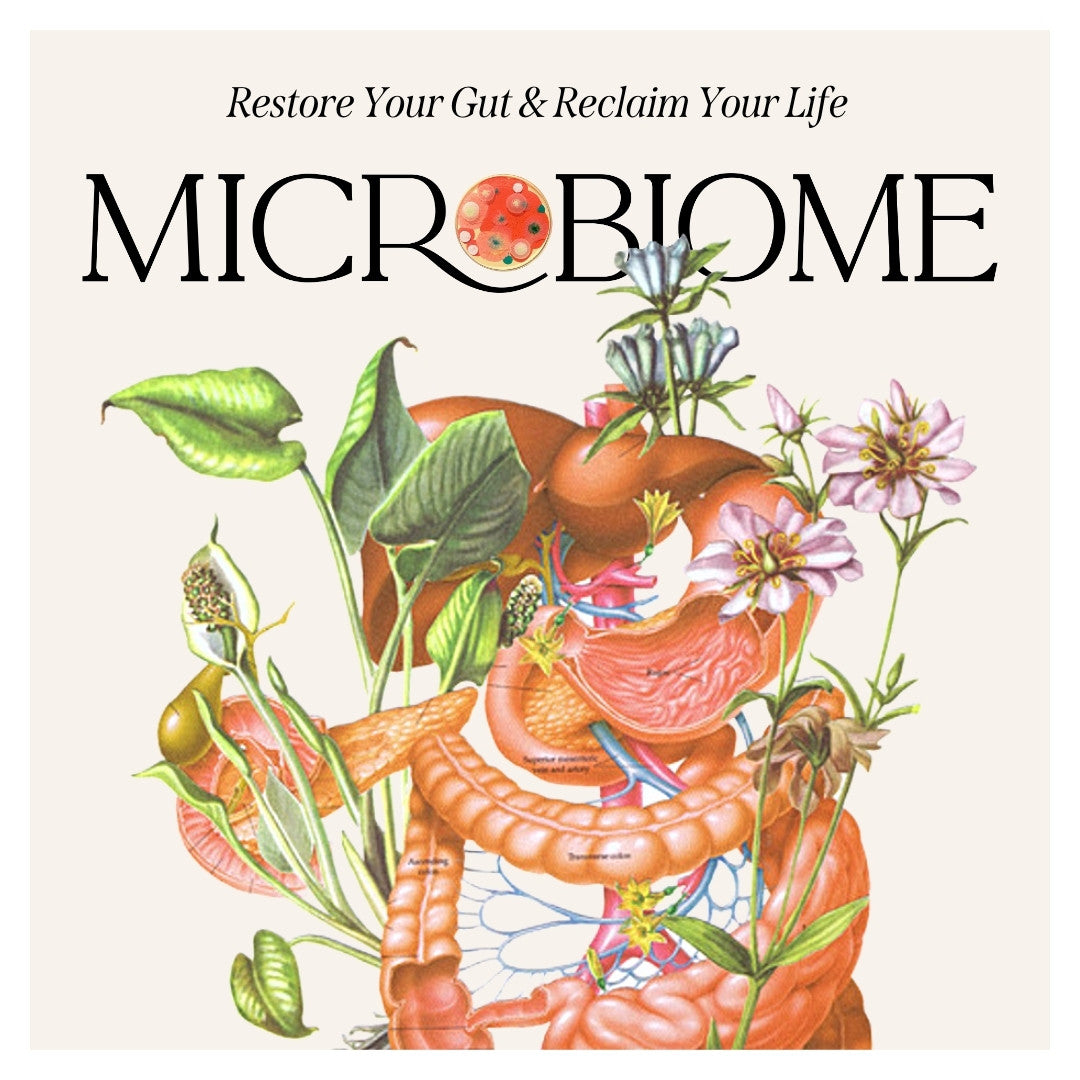

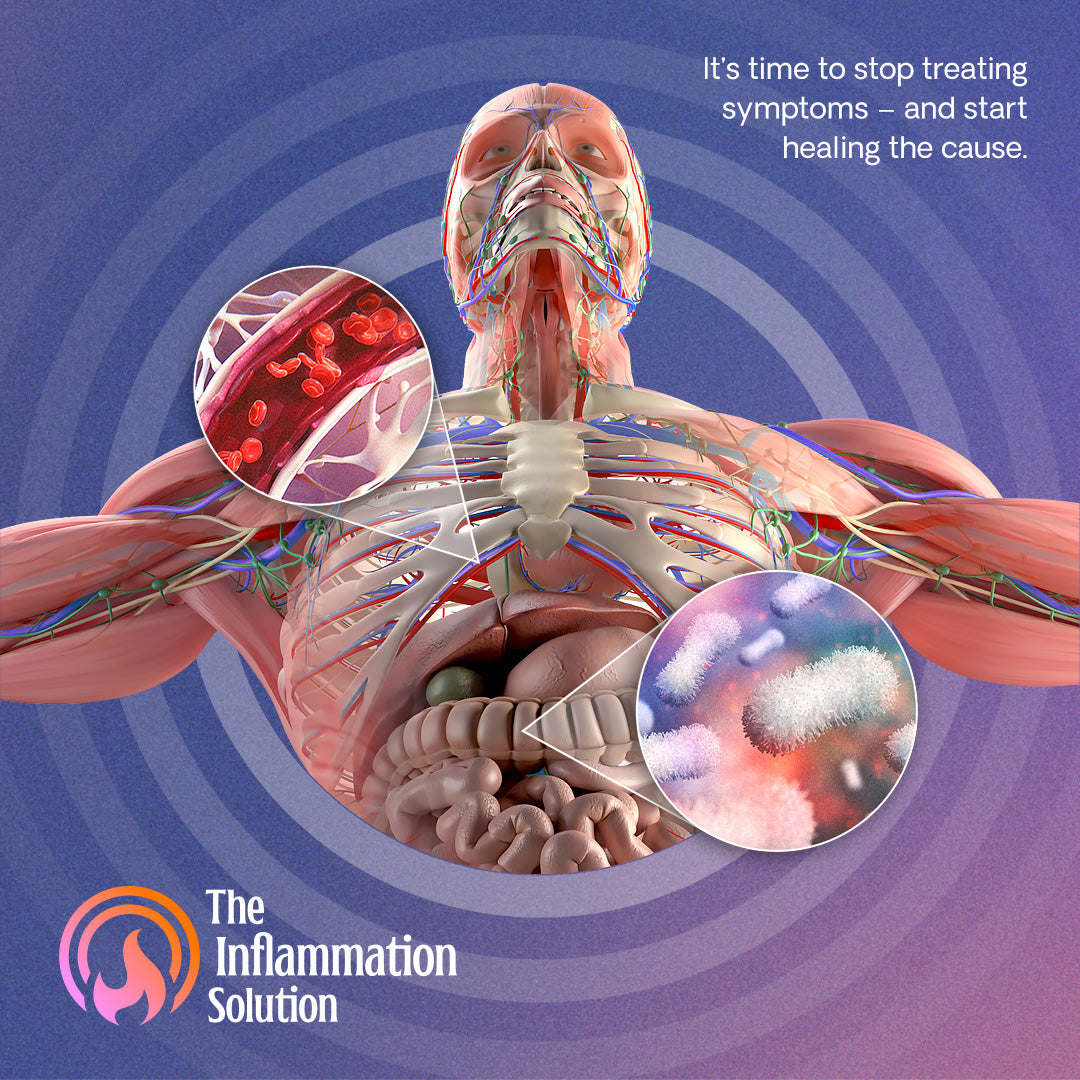
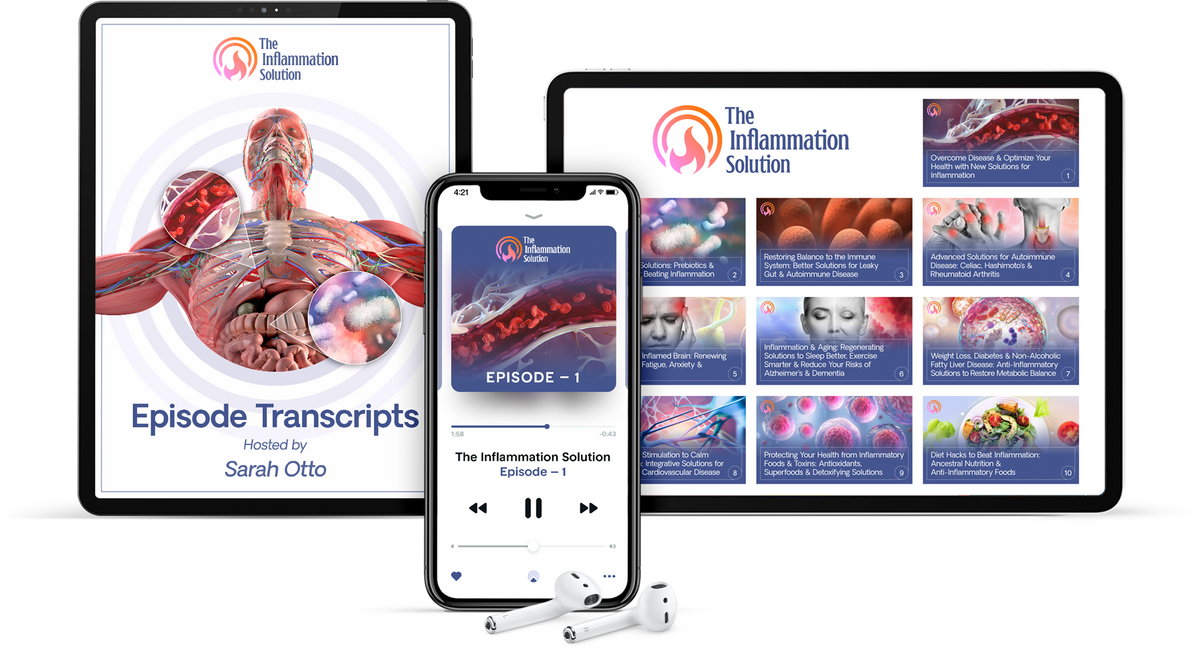
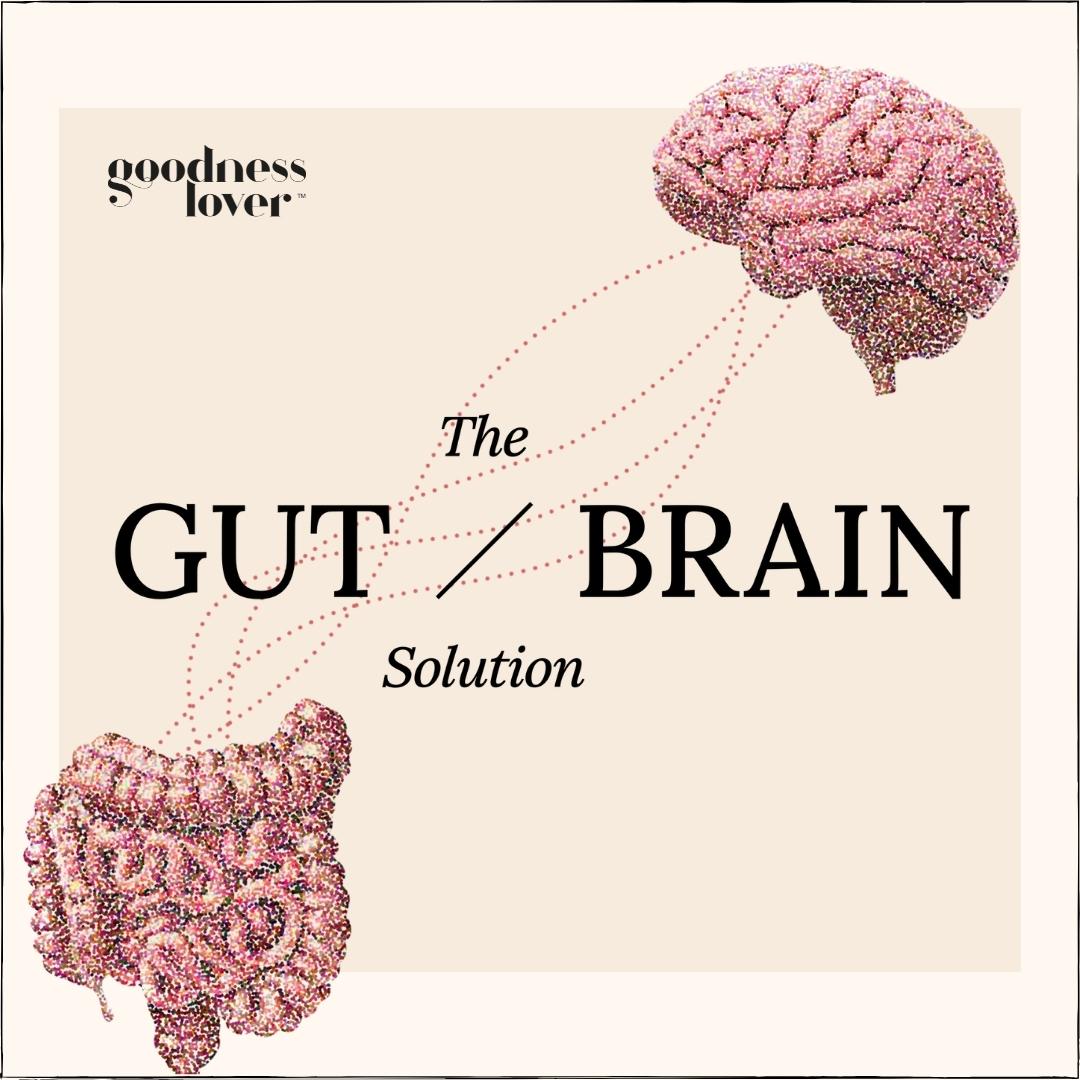

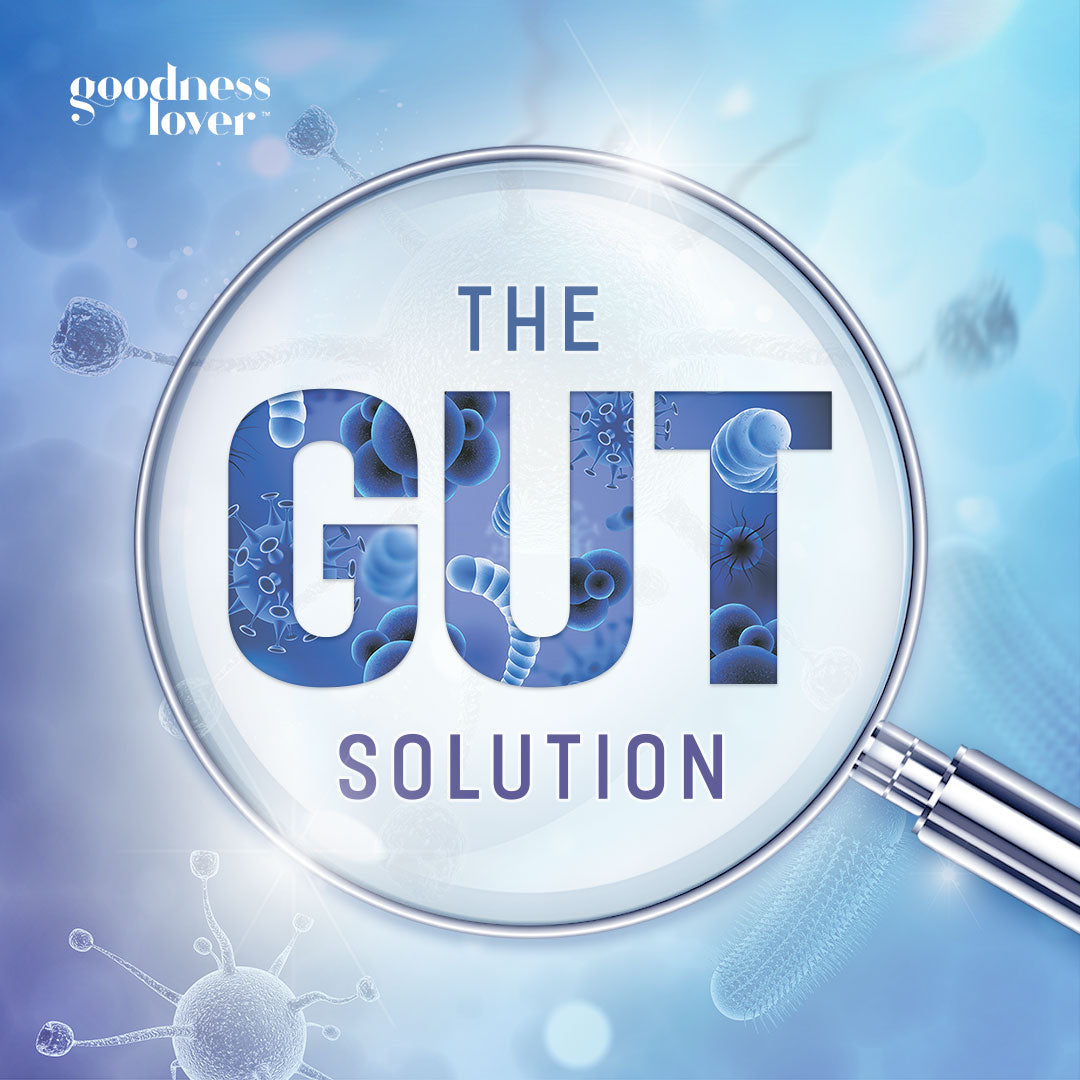
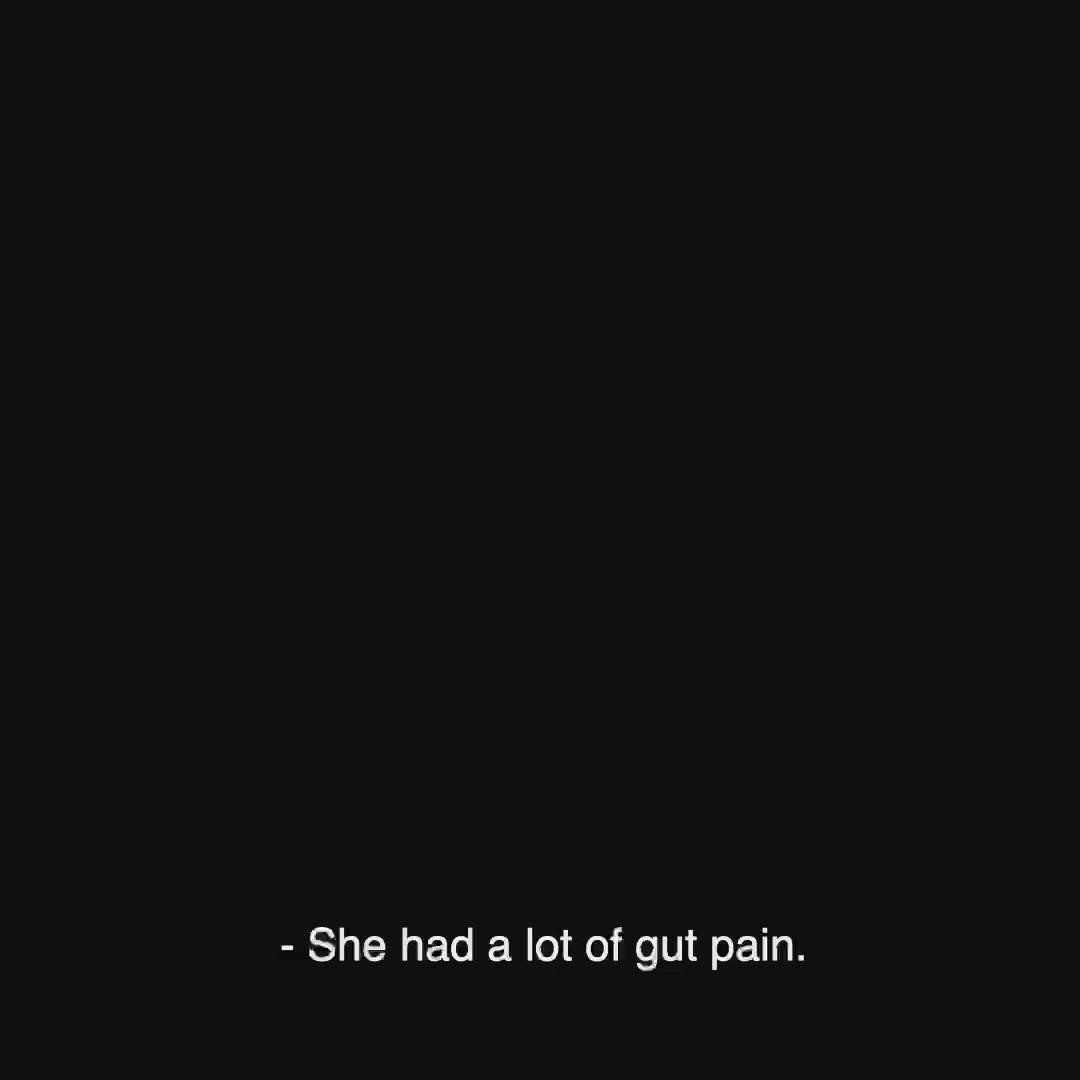
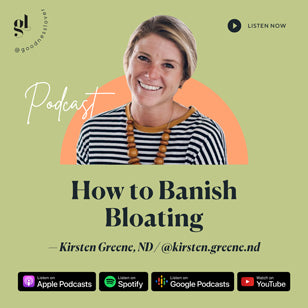
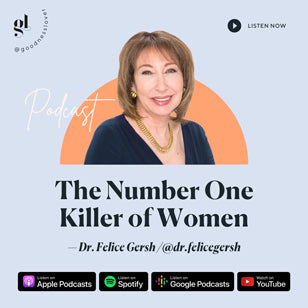

What Do You Think? Comment Below: